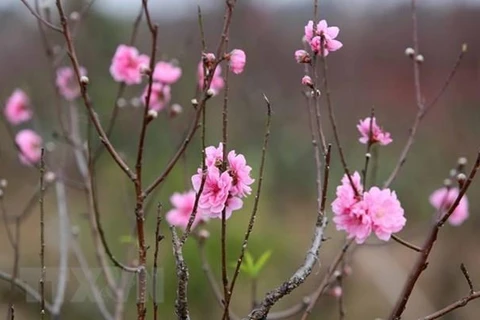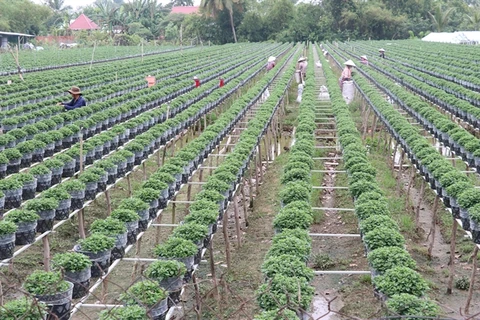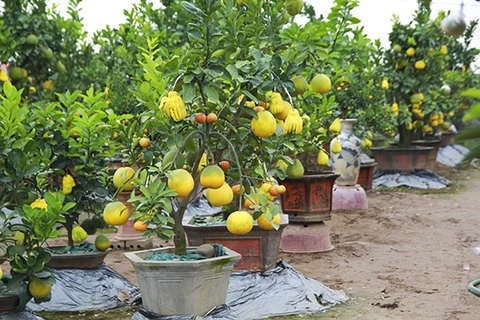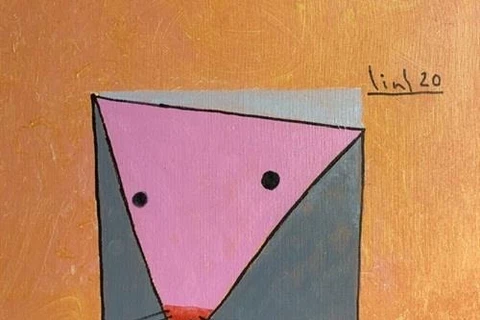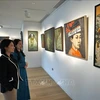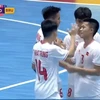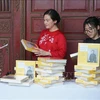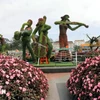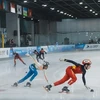
“Dam cuoi chuot” (Rat's wedding) is a popular example of Vietnamese Dong Ho folk painting (File Photo)
Hanoi (VNA) – The rat is a special species of animal in the Vietnamese folk culture with many idioms and proverbs describing its fate.
In the Vietnamese language, the word “chuot” may mean either rats or mice. In the Vietnamese culture, rats, or more precisely, rice field rats, are noted for their co-existence with wet-rice agriculture.
Some local culturists explain that the rat has a very quick reproduction rate. In the old days of an agricultural Vietnam, bumper crops also gave rise to expanding rat populations on the rice fields. In the Mekong Delta, local people believe that the squeak of rats or mice is the harbinger of a coming bumper crop and a prosperous new year.
Some notable idioms and proverbs about the rat are as follows:
“Chuot chay cung sao” (literally, rats are ubiquitous on the field). It means one has no strength or patience left, or is at his or her wits’ end.
To make fun of the snobbish, Vietnamese folk poetry has a verse “Chuot che xo bep chang an.” (literally, rat refuses to eat at the kitchen corner).
“Chuot doi vo trung” (literally, rat wears eggshell) aims to disregard those who want to hide their evil and bad nature with a fake cover.
Describing daring, reckless, adventurous people, there is a saying “Chuot gam chan meo” (literally, rat gnaws cat's feet).
People who lived in poverty in the past suddenly met fortunes, changed their lives, full of happiness, are described as “Chuot sa chinh gao” or “Chuot sa bo nep” “Chuot sa lo mo” (literally, rat fortunately finds rice and fat).
Criticising those who “bite off more than one can chew”, there is a saying “Meo nho bat chuot to” (literally, kitten catches big rat).
In life, there are many risks, sometimes we fall into dangerous situations. In this case, it’s said “Chuot sa cui meo” (literally, rat falls into cat’s traps).
To imply people with cunning look, just wait to do evil and harm people, there is a metaphor “Mat doi may chuot” (literally, to have eyes like a bat and eyebrows like a mouse).
To refer to the hypocrite, the proverb says “Meo gia khoc chuot” (Old cat cries out mice).
To describe people who often talk about trivial things, it’s said “Noi doi noi chuot” (talk the bats, talk the mice).
“Chay nha moi ra mat chuot” (literally, when a house is on fire, rats appear) is used to describe the least loyal or trustworthy people.
“Dau voi duoi chuot” (a flash in the pan) is to describe people who do superior work at first, but eventually the outcomes are poor and useless.
“Chuot bay dao khong nen lo” (mouse cannot dig a hole) is to critise those who are irresponsible to the common work.
Actions that cause greater losses than the result, people often say “Nem chuot vo chum” (literally, throw the mouse with a vase).
Rats are usually active at night and hide during the day. Therefore, the saying “Thi thut nhu chuot ngay” implies sneaky people.
The proverb "Chuot chay ho duoi” (mouse running with tail up) means a secret is unveiled.
To criticise those who are ignorant or appear to be proficient, there is a saying "Chuot chu nem dam” (shrew tastes vinegar).
Vietnamese folk poetry has verses: The cat climbs up the areca tree. Asks where did the mouse go? The mouse goes to the far away market. Buys fish sauce and salt to cook for the death anniversary of the cat's father./.

